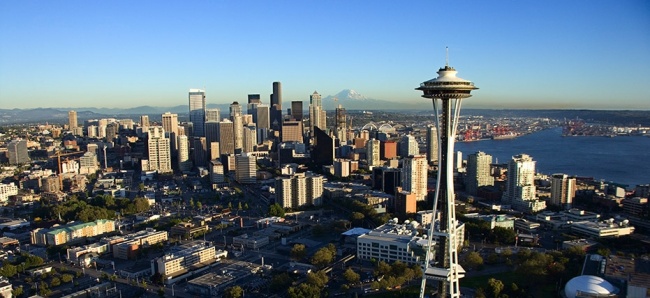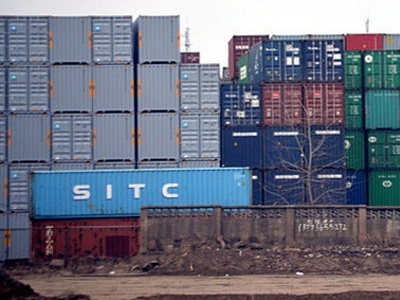As many readers know, I make my home in Seattle, land of strong coffee, loud music, trash-talking football players, rainy winters, and one or two high-tech companies you might have heard of. Seattle is simultaneously one of the most prosperous urban areas in the country and one of the most politically progressive. San Francisco may have us beat on both, but not by much. Both are also among the most expensive places to live if you are not part of the currently-booming tech economy.
Like San Francisco, Seattle recently voted to raise the minimum wage gradually over the next several years from its current level of $11/hour to $15/hour at a speed determined partly by the size of the business and partly by whether or not a business provides medical benefits, but in no cases later than 2019.
The rent’s too damn high! Raising the floor for working people is a good thing in many ways. The average rent for a one-bedroom apartment within 10 miles of Seattle is $1434 – if you can find one; vacancies are at a multi-year low. If you work a low-income job in the metro area, you’re either cramped into a very small space with parents or roommates, or facing a long, expensive commute on our traffic-clogged roads. Honk if this story sounds the same in your town.
Putting more money into the pockets of baristas, burger-flippers, loading dock workers, delivery drivers, nurses’ aides and non-union laborers of all descriptions will go a long way toward making life a little more affordable at the outskirts of Techtopia. It may have macroeconomic benefits in the aggregate, as minimum-wage workers tend to spend most of what they make – and spend it locally. And certainly as a matter of simple fairness, 99% of the productivity gains of the US economy over the past 30 years have gone to the top 10% (mostly the top 0.1%, in fact). It’s about time that working people get a raise.
Unfortunately, there is one very specific economic actor to whom all these good things do not apply. That is the owner of a particular type of small business that either does not have control of the pricing of the goods that it sells (because the prices are marked on the merchandise by the manufacturer), or produces goods that are sold mostly outside of the local market and therefore must bear the higher labor costs but not receive the macroeconomic benefits of increased local demand.
In simple English, a comic/game/hobby retailer or a small publisher.
Retailers in the crosshairs. Last month, San Francisco-area retailer Brian Hibbs gave a detailed analysis of this situation in an interview with Heidi MacDonald at The Beat, discussing the efforts that he is undertaking to keep his iconic business Comix Experience afloat in the face of rising labor costs. Alan Beatts of Borderland Books voiced some of the same concerns earlier this year when he announced his SF bookstore was closing in March. Tom Spurgeon wrote about this issue in relationship to the Seattle-based publisher Fantagraphics last summer. I’ve had conversations with retailers around Seattle on this issue as well.
In every case, the business owners clearly recognize the value that their employees bring to the business and express an earnest desire to pay fair wages. And in just about every case, the math doesn’t look good.
A few exceptionally profitable and well-run stores are probably generating good money for their owners, but from most of what I have heard, if you are looking to get rich, running a comic or hobby retail store or small press is not really the way to do it. Adding $80-90K in labor costs per year could wipe out nearly all of what the owner hopes to take home after rent, taxes, insurance and other expenses. Even retailers operating their businesses as a lifestyle or a labor of love can’t afford to do it on a volunteer basis.
Unintended consequences. It’s one thing if competition or poor management drives a company under. That’s capitalism. It’s how the system works in the US. We also have democracy, which means that voters can go to the polls and say "we want to address the problems of the working poor by making it harder for businesses to profit by paying low wages." All policies, including the status quo, have winners and losers, and citizens have a right to choose the economic system they want to live under.
But in this case, the choice was not framed in those terms. The proponents of the minimum wage increase were pretty strident in their rhetoric. It was all about bad big businesses, overworked single moms and the need to redress big social and economic problems by starting at the local level.
The odd exception of a local business where both the owner and the employees were trading maximum economic gains for lifestyle advantages didn’t occur to policymakers, and still evinces little sympathy or understanding. By legislating with a meat cleaver instead of a scalpel, they’ve put at risk the very kinds of businesses that I’m betting most progressive voters see as essential to the vibrancy and vitality of urban living.
The owners of small shops aren’t the Koch brothers. They are employing local people, paying local taxes, sending their kids to schools and contributing to the community. They try to do right by their workers, but at what point is it ok for the lowest paid person at a business, hour for hour, to be the person who owns it?
As Hibbs notes in his interview, employees often deliberately decide to accept lower wages to work the job they want, in an environment where they have agency and engagement. Is it really doing workers any favors to say we’re going to put your long-time employer out of business, but don’t worry, you can find better paid work as a security guard or warehouse grunt?
I really hope I am wrong about this. This is a troubling issue because 90% of what the minimum-wage advocates say is right, just and true and it is in many ways sketchy public policy to carve out an exemption for such a narrow class of businesses.
And hey, maybe that $80-90K per year in added costs isn’t so unbearable in the long run. Maybe the affected businesses will find creative ways to increase revenues and derive value from their workforce in excess of the higher wages. Maybe all the better-paid burger flippers and leaf-rakers will spend their extra money on games, comics and toys. Maybe the industry will find a way to support retailers facing these kinds of higher costs.
But I’m afraid we’re going to lose a lot of good businesses and good workers in this industry before we find out for sure.
--Rob Salkowitz (@robsalk) is the author of Comic-Con and the Business of Pop Culture.
The opinions expressed in this column are solely those of the writer, and do not necessarily reflect the views of the editorial staff of ICv2.com.








